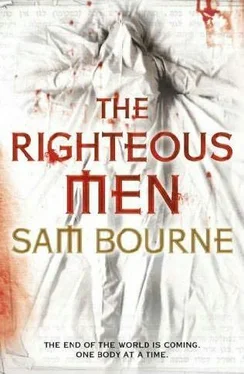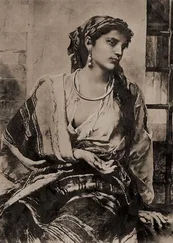Sam Bourne - The righteous men
Здесь есть возможность читать онлайн «Sam Bourne - The righteous men» — ознакомительный отрывок электронной книги совершенно бесплатно, а после прочтения отрывка купить полную версию. В некоторых случаях можно слушать аудио, скачать через торрент в формате fb2 и присутствует краткое содержание. Жанр: Триллер, на английском языке. Описание произведения, (предисловие) а так же отзывы посетителей доступны на портале библиотеки ЛибКат.
- Название:The righteous men
- Автор:
- Жанр:
- Год:неизвестен
- ISBN:нет данных
- Рейтинг книги:3 / 5. Голосов: 1
-
Избранное:Добавить в избранное
- Отзывы:
-
Ваша оценка:
- 60
- 1
- 2
- 3
- 4
- 5
The righteous men: краткое содержание, описание и аннотация
Предлагаем к чтению аннотацию, описание, краткое содержание или предисловие (зависит от того, что написал сам автор книги «The righteous men»). Если вы не нашли необходимую информацию о книге — напишите в комментариях, мы постараемся отыскать её.
The righteous men — читать онлайн ознакомительный отрывок
Ниже представлен текст книги, разбитый по страницам. Система сохранения места последней прочитанной страницы, позволяет с удобством читать онлайн бесплатно книгу «The righteous men», без необходимости каждый раз заново искать на чём Вы остановились. Поставьте закладку, и сможете в любой момент перейти на страницу, на которой закончили чтение.
Интервал:
Закладка:
Without them, the world collapses.'
'Tova Chaya has summarized it well. There is some discussion about the origin of the idea. Some scholars think it dates back to Abraham's argument with the Almighty over the people of Sodom.'
TO could tell Will did not know of any such argument and that Rabbi Mandelbaum was not about to explain it. She stepped in. 'Basically, God was about to destroy the entire city of Sodom because they had become sinful,' she said in a semi-whisper, keen to get this out of the way rather than opening up a new discussion with her old teacher. 'Abraham tries to make a deal, proposing that if he, Abraham, can find fifty good people in the town, then God should spare it. God agrees and then Abraham starts negotiating. In that case, he says, if you'd save it for fifty, then what about forty? God agrees to that, too. They keep haggling until finally Abraham has beaten God down to ten good men. OK, God says, find me ten good people and I'll save Sodom. So that establishes the principle that, so long as there are some truly righteous people around, the rest of us are OK. We're saved because they are in the world.'
Rabbi Mandelbaum picked up the thread. 'There is some dispute about the exact numbers. Some say thirty, some say forty-five. But from the fourth century or so, the number becomes settled on thirty-six. As Rabbi Abaye writes, "There are in the world not less than thirty-six righteous persons in every generation upon whom the Shekhina rests".'
'Sorry. What was that word?'
'My apologies. The Shekhina is God's radiance, the Divine Countenance.'
Still in a semi-whisper, TO said: 'It refers to the outward appearance of God. It's kind of like a divine light,' adding with what Will felt sure was pride, 'it's feminine.'
'I want to be sure I understand this correctly,' Will began, haltingly. 'Jewish teaching holds that there are thirty-six people alive at any one time who are truly righteous. They may be hidden away in obscurity, doing humdrum jobs, living flawed, even sinful lives. But, quietly and in secret, they perform acts of extraordinary goodness. And so long as they're around, we're all OK. They keep the world afloat.' Will finally understood the last clue: the statue of Atlas at the Rockefeller Center, carrying the whole universe on his shoulders.
'Which means,' he said, his voice slowing, 'that if they were not around, for whatever reason, it would, literally, be the end of the world.'
Heavily and slowly, the aged rabbi nodded. 'I'm afraid that's exactly what it means.'
CHAPTER FORTY-FIVE
Sunday, 8.46pm, Crown Heights, Brooklyn
So this was why people were dying. For nothing more than a bizarre, quasi-biblical legend. The waste of life struck Will with new force: what insanity, what cruelty, for Howard Macrae or Pat Baxter to be murdered in the name of a lunatic fantasy. The end of the world indeed! It was obviously nonsense. Who could seriously believe thirty-six people kept the world alive? Will had not breathed in the empirical, sceptical air of Oxford for nothing. He had been taught to dismiss such bunkum out of hand: it made more sense to believe in fairies at the bottom of the garden.
And yet what he thought was surely irrelevant. Someone obviously did believe it — with an intensity that made them ready to kill wholly innocent men, all over the world. If this was the killers' motive, what did it matter whether it was rational or not?
That was what Will told himself. But still something nagged.
Something about this man and his books; something about the respect TO had for him. Something about TO, Tova Chaya, herself. These people were not bug-eyed maniacs. They were keepers of an ancient tradition which had endured since the city of Sodom. The story of the thirty-six had been passed down quietly, generation after generation, from the days of Abraham through centuries of wanderings from Babylon to eastern Europe and, now, to America. Jews were not cranks, latching onto fantasies; not as far as he knew. His conversations with TO had always projected the same impression: that Judaism was not concerned with the supernatural, so much as with the way real human beings treated each other in the here and now. They did not seem to believe in flying saucers or cripples throwing away their crutches. They were more grounded than that. So if they believed in the hidden presence of thirty-six good men, maybe there was a reason.
Something else dulled Will's usually sceptical instincts. If he had not discovered it for himself, he would never have believed it. But Macrae and Baxter, Samak in Bangkok and Curtis in London had fitted the rabbi's description perfectly.
They had indeed performed acts of uncommon goodness and had done so entirely in private. They had shunned publicity, just as the legend demanded. (Will's strong hunch was that, until he started digging, the righteous acts of Baxter and Macrae, at least, had been entirely unknown.) The four people he knew about had even disguised themselves as sinners, people who would be reviled rather than revered. A pimp and a politician, for heaven's sake!
What if he accepted the existence of these lamadvavniks, just for the sake of argument? That allowed a new thought to encroach. until that moment, his sole interest had been in discovering how this strange, ancient story might lead him back to his wife. Now he felt his hands go moist at a different notion. If this myth had any grounding in reality, then the pursuit of the righteous men was not just a cruel crime. It would also bring disaster upon the world. For the first time he understood Rabbi Freilich's words to him on the telephone the previous evening. Your wife matters to you, Mr Monroe, of course she does. But the world, the creation of the Almighty, matters to me.
Thirty-six, thought Will. It was so few. Just thirty-six people on the whole of this crowded, cramped planet, teeming with, what, six billion people? Four men were dead, he knew that.
Did that mean there were another thirty-two dead, or dying, in far-off corners of the world, all but unnoticed?
He remembered again his conversation with Rabbi Freilich. An ancient story is unfolding here, threatening an outcome that mankind has feared for thousands of years. So this is what he meant. The ancient story was the legend of the lamad vav, the thirty-six righteous men. The outcome feared for so long was nothing less than the end of the world.
Whoever had been sending those text messages knew all this, Will now realized. While Rabbi Mandelbaum stretched for another book, Will stole a glance at his cell phone, to look at the last message he had received. A four-line poem, a quatrain.
Just nen we are, our nunber few
Describable in digits two
We're halted if these do Multiply
If we few perish then all must die.
Just men… describable in digits two. The two digits were three and six. If these do multiply. Three times six was eighteen, half of thirty-six: We're halved. And the texter understood what was at stake. If we few perish then all must die.
Will tried hard to compose himself. He wanted desperately to produce his notebook, to start ordering all this information.
Still, he had to ask some questions.
'These thirty-six? Are they all Jewish?'
'Usually in' Hassidic folk lore the tzaddikim are Jewish. But this is more sociology than theology: who else did these yidden know? They knew only Jews. That was their entire world.
In the early rabbinic writings, there are different views on the identity of the tzaddikim. Some believed they all lived in the land of Israel, some said that a portion lived outside it; others said that the righteous men emerged from the goyim, the Gentiles. There is no settled view. It could be all Jews, all non-Jews or a mixture.'
'But they're always men?'
Читать дальшеИнтервал:
Закладка:
Похожие книги на «The righteous men»
Представляем Вашему вниманию похожие книги на «The righteous men» списком для выбора. Мы отобрали схожую по названию и смыслу литературу в надежде предоставить читателям больше вариантов отыскать новые, интересные, ещё непрочитанные произведения.
Обсуждение, отзывы о книге «The righteous men» и просто собственные мнения читателей. Оставьте ваши комментарии, напишите, что Вы думаете о произведении, его смысле или главных героях. Укажите что конкретно понравилось, а что нет, и почему Вы так считаете.












